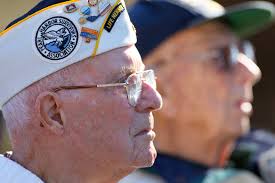“Many older war-era veterans and surviving spouses over the age of 65 across America are missing out on a major element in securing their retirements: the Aid and Attendance benefit for long-term care ,” writes Kevin Richards in a kiplinger.com piece that may come as news to older veterans (as it did for one like myself). Richards continues:
,” writes Kevin Richards in a kiplinger.com piece that may come as news to older veterans (as it did for one like myself). Richards continues:
“The Aid and Attendance benefit is available to veterans and their spouses to help offset recurring medical costs and some of the costs for home care and assisted living care. This is a benefit for senior veterans who served during wartime—World War II, the Korean War, Vietnam and the Gulf War—for at least 90 days of active duty and who are 65 or older, as well as their surviving spouses. It doesn’t matter if the veteran served stateside or internationally, saw combat or didn’t, was wounded or wasn’t. If the veteran’s doctor—not a VA doctor—affirms the veteran or spouse needs assistance, then he or she may be eligible for Aid and Attendance, regardless of Social Security, Medicare, pensions or other benefits.
“These benefits can be quite substantial, even if they are a variable number. Under Aid and Attendance, a veteran living alone can receive as much as $21,456 annually, or $1,788 a month. A married veteran can receive as much as $26,550 annually, or $2,210 a month. A surviving spouse is eligible for as much as $13,788 annually, or $1,149 a month. These benefits are paid directly to the veteran or surviving spouse and are tax-free. Payments are retroactive to the date of application.
“Many veterans and surviving spouses are not aware of the Aid and Attendance benefits they have earned, or they are confused about them. Too many veterans are told they can’t have a certain level of income or assets to apply for Aid and Attendance. That’s simply incorrect. As long as the veterans and surviving spouses meet the criteria, they are eligible for those benefits for the rest of their lives.
“Some of this confusion and lack of knowledge is perfectly understandable, since the application process can be complex. The U.S. Department of Veterans Affairs (VA) cannot give veterans legal or financial advice on how to get qualified for the Aid and Attendance benefits. Even worse, if a veteran asks about the benefits, the VA will simply tell them to apply. The VA will not tell veterans the requirements or how a veteran can qualify based on the rules. Only around 20% of veterans who apply on their own for Aid and Attendance benefits ever receive them.
“However, if a veteran follows the rules, they are able to receive the benefits. My firm has been working with veterans and surviving spouses on Aid & Attendance benefits for more than five years. During that time, we have helped more than 300 veterans and surviving spouses obtain the benefits they have earned through their service defending this nation. Unfortunately, around 80% of the veterans who we have met with over the years are not aware of or misunderstand these benefits.
“That’s why it’s important to get the facts about Aid and Attendance benefits from credible, unbiased sources with the ability to provide the correct information. The VA cannot and will not do that.
“There are billions of dollars already set aside in Aid and Attendance benefits that veterans and surviving spouses have earned. Veterans and their families should not feel guilty about having earned these benefits through their noble efforts and service. Working with a trusted and experienced financial adviser will ensure our heroes are able to receive the Aid and Attendance benefits that they have earned through their sacrifices and hard work in defending this country.”
